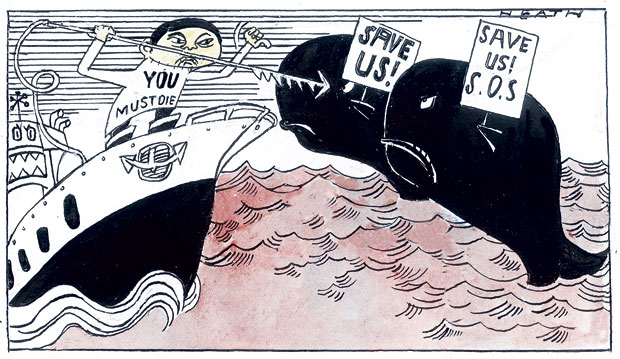If the Faroe Islanders want to eat whale, let them. So says Tim Ecott in today’s Spectator. He argues that the Faroese – who live on dramatic and remote islands in the North Atlantic – shouldn’t be victimised for killing less than 0.1% of the pilot whale population annually for food. There are far more pressing marine issues that we should be concerned about – for example the 100 million sharks slaughtered for shark fin soup, or how the EU has allowed tuna stocks to be decimated.
The problem is, many people don’t agree with him. We’ve all heard that whales are highly intelligent, social and family orientated creatures, and that severing their spines isn’t very nice. The Faroese must, therefore, be stopped.
Sea Shepherd, the environmental campaign group, has set up a campaign to raise awareness of the Faroese whale slaughter, called the grindadráp. As Ecott writes:
“The campaign is gathering rapid traction on social media, and video clips of the Faroese hunt have been ‘liked’ and circulated in their hundreds of thousands. In those clips, the sea is stained red, the flapping pilot whales are dragged ashore with ropes and grappling hooks, and they are killed with a sharp instrument that severs the spine close to the head, resulting in almost instantaneous death.”
It’s no surprise that pictures of a bloody sea, struggling whales, and a plea to ‘stop this cruel slaughter’ attracts thousands of ‘likes’. Every day pictures and petitions are liked and shared on social media by millions of people – and savvy PRs have realised that this is a good way of getting their cause into the public eye. Someone who knows next to nothing about whales, the Faroe Islands, or marine issues at all will happily share a picture of a blood-red sea. Well, why wouldn’t you? It looks appalling, so surely it must be appalling, no?
Perhaps part of the problem is our immediate ability to be offended by things that we know little about. A similar reaction happened with the pictures released by the League Against Cruel Sports earlier this week, of terriermen shooting and then digging out a pair of foxes from a badger set. Of course the pictures look atrocious; they involve a combination of blood and wild animals. But again, people – including the media – were quick to jump to conclusions without understanding the situation, or knowing the facts.
Whether or not you agree with culling foxes to protect your Sunday roast is one thing – as is having an opinion on whether or not the Faroese should continue with their tradition of hunting any unfortunate pilot whales that get too close to shore. But immediately assuming that any picture that involves blood must be cruel is another. It may not be pretty; but looks can be deceiving, and not everything is as black and white as it may seem on the surface.







Comments